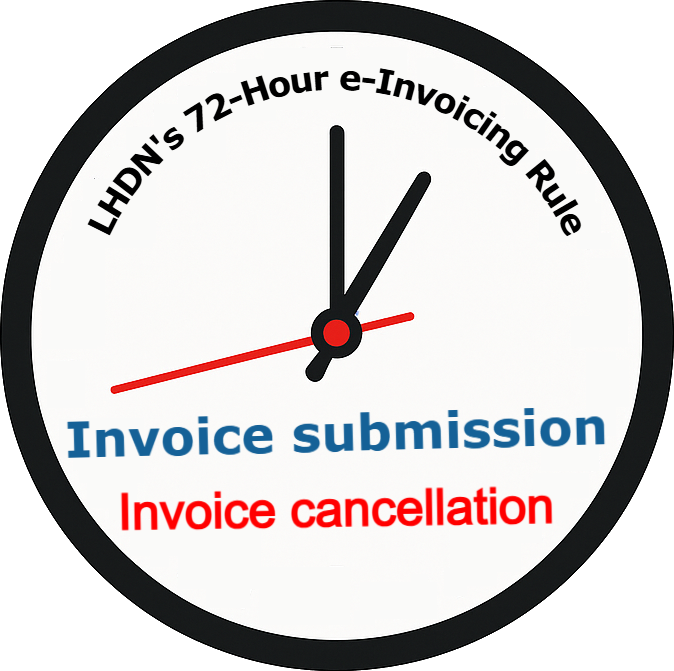This post is also available in:
Bahasa Malaysia
As Malaysia starts with e-Invoicing, the Inland Revenue Board of Malaysia (LHDN) has introduced specific compliance rules that businesses must follow. One important rule that can easily catch companies off guard is the 72-hour rule for e-Invoice submission and cancellation.

According to LHDN’s e-Invoice guidelines:
Submission of invoices
“The invoice date must not be more than 72 hours (3 days) before the date the e-Invoice is submitted to LHDN.”
— [LHDN e-Invoice Specific Guideline, updated June 2024]
Cancellation of invoices
“Cancellation of e-Invoice can only be performed within 72 hours from the date and time the e-Invoice is validated.”
— [LHDN e-Invoice Specific Guideline, Section 7.3.1, updated June 2024]
Let’s break down what this means and why it’s especially critical when you’re closing your financial year.
What is the 72-Hour Rule?
For Invoice Submission
The invoice date (i.e., the date stated on your e-Invoice) must be no more than 3 days older than the date you submit that invoice to LHDN’s MyInvois system.
Example:
If your invoice is dated 28 December, you must submit it to LHDN no later than 31 December (72 hours from the invoice date). Failing to do so may result in rejection of the invoice or compliance issues.
For Invoice Cancellation
Once an e-Invoice has been validated by LHDN, you only have 72 hours to cancel it. After that, cancellation is no longer allowed. You must issue a credit note or debit note instead to correct any errors.
How This Impacts Financial Year-End Closing
For most companies in Malaysia with a 31 December financial year-end, this rule has serious implications:
1. Invoices Must Be Submitted Before Year-End Cutoff
If you issue an invoice dated 30 or 31 December but delay submission until 2 or 3 January, you’re outside the 72-hour window, and the invoice may have to be reissued with a January date, pushing income into the next financial year.
2. Limited Time to Cancel Incorrect Invoices
If an error is discovered in a validated invoice (e.g., wrong customer, value, or tax treatment), you only have 72 hours to cancel it. After that, adjustments can only be made through credit or debit notes.
3. Revenue Recognition Affected
Incorrectly dated or late-submitted e-Invoices could lead to misstated revenue in your year-end accounts. This can affect tax filings, audits, and even SST tracking.
4. Tighter timelines for finance
Finance teams will need to coordinate closely with sales and operations to ensure all invoices for the year are issued and submitted to LHDN within the 72-hour deadline, especially during the holiday season when offices may be closed.
Best Practices to Stay Compliant
- Plan Year-End Invoicing Early
- Don’t wait until 31 December to invoice.
- Ideally, issue and submit all final-year invoices by 28 December.
- Double-Check Before Submission
Make sure invoice details are accurate before validation, as cancellation is only available for a short window. - Set Internal Cut-Off Dates
- Establish a company-wide internal deadline for final billing and submission (e.g., 27 December).
- Educate Staff
- Ensure your team understands the timing requirement and builds it into their year-end procedures.
In summary
LHDN’s 72-hour rules on both submission and cancellation aren’t just administrative—they can have real financial and compliance consequences if ignored. As we approach the next financial year-end, businesses must tighten their invoicing processes, review internal timelines, and consider using automated e-Invoicing tools.
Need help with e-Invoice implementation and compliance?
Adventus can help set up, configure, and guide your finance team—so your business stays compliant and avoids last-minute chaos.